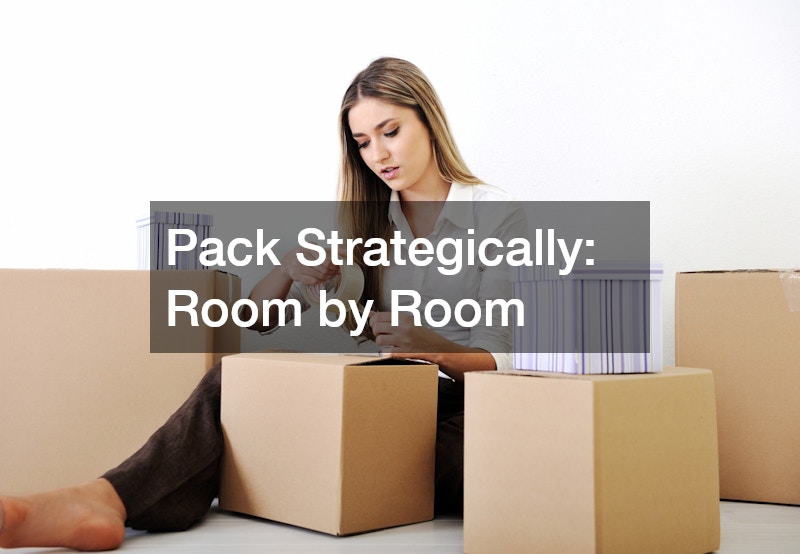
Moving to a new place can be both exciting and stressful. Whether you are relocating for a new job, to be closer to family, or just for a change of scenery, the process of moving involves a lot of planning and organization. In this comprehensive guide, we will explore some essential moving 101 tips and tricks to make your moving experience smooth and hassle-free.
Start Planning Early

When it comes to moving, one of the key things to remember is to start planning early. Long distance movers recommend that you begin the process at least a few months in advance to avoid last-minute stress. Create a moving checklist to keep track of all the tasks that need to be done, from decluttering and packing to hiring a moving company and setting up utilities at your new place.
Research different moving companies and get quotes to compare prices and services. Look for reputable movers with positive reviews and experience in long-distance moves. Booking your moving date early can also help you secure the best rates and availability with the moving company.
Consider your budget and allocate funds for all aspects of the move as part of your moving 101, including packing supplies, transportation, and any additional services you may need. Factor in unexpected costs that may arise during the moving process to avoid any financial surprises later on. Planning ahead will ensure a smoother and more organized move.
Declutter and Downsize
Before you start packing, take the time to declutter and downsize your belongings. Residential moving services recommend getting rid of items you no longer need or use to lighten your load and reduce moving costs. Go through each room in your home and decide what to keep, donate, sell, or toss.
Sort through your belongings and separate them into categories to make the decluttering process more manageable. Consider hosting a garage sale or listing items online to make some extra cash and reduce the number of things you need to pack and move. Donate gently used items to local charities to give back to the community and help those in need.
Downsizing can also help you start fresh in your new home with a clutter-free environment. Simplifying your belongings as part of your moving 101 can make unpacking and organizing easier and more efficient once you arrive at your new place. Decluttering is an essential step in the moving process that shouldn’t be overlooked.
Create a Moving Budget
Setting up a moving budget is crucial to ensure you stay on track with your expenses and avoid overspending. Moving services recommend creating a detailed budget that includes all costs associated with the move, such as packing supplies, transportation, insurance, and temporary storage if needed. Factor in any additional expenses, such as meals on the road or pet boarding, to account for unexpected costs.
Compare quotes from different moving companies and choose one that fits within your budget while providing the services you need. Be sure to read the fine print and ask about any hidden fees or extra charges that may apply. Planning your budget ahead of time will give you peace of mind and help you stay organized during the moving process.
Consider using a moving expenses tracker or spreadsheet as part of your moving 101 to monitor your spending and adjust your budget as needed. Keep all receipts and invoices related to the move for tax purposes or reimbursement by your employer if the move is job-related. Having a clear budget in place will help you make informed decisions and avoid financial stress on moving day.
Research and Hire a Reputable Moving Company

When it comes to hiring a moving company, it’s essential to do your research and choose a reputable and reliable company. Local moving companies can offer personalized services and local expertise to ensure your move goes smoothly. Look for movers with a valid license and insurance to protect your belongings during transit.
Check online reviews and ask for recommendations from friends or family who have recently moved. Visit the company’s website and read customer testimonials to get an idea of their reputation and level of service. Schedule a consultation with the moving company to discuss your needs and get a detailed quote for their services.
Make sure to book your moving date well in advance as part of your moving 101 to secure availability with the moving company. Communicate clearly with the movers about any special requirements or fragile items that need extra care during the move. Hiring a reputable moving company can save you time and effort on moving day and provide you with peace of mind knowing your belongings are in good hands.
Decide on DIY vs. Professional Packing
One of the decisions you’ll need to make when planning your move is whether to pack your belongings yourself or hire professional packing services. Professional moving companies offer packing services that can save you time and effort during the moving process. They have the expertise and equipment to pack your items safely and efficiently.
If you choose to pack yourself, start early and gather all the necessary packing supplies and tools. Label boxes clearly and pack strategically by room to make unpacking easier once you arrive at your new home. Consider using color-coded labels or a numbering system to keep track of your boxes and ensure nothing gets misplaced during the move.
Remember to protect valuable and fragile items as part of your moving 101 by wrapping them in bubble wrap or packing paper and placing them in sturdy boxes. Use padding or cushioning materials to prevent breakage and secure items in place. Whether you decide to pack yourself or hire professionals, packing efficiently is essential to a successful and stress-free move.
Gather Packing Supplies and Tools
Before you start packing, make sure you have all the necessary supplies and tools on hand. Moving companies recommend investing in high-quality packing materials to protect your belongings during transit. Gather boxes in various sizes, packing tape, bubble wrap, packing paper, markers, and labels to ensure a smooth packing process.
Visit your local home improvement store or contact a moving company to purchase packing supplies. You can also ask friends or family who have recently moved if they have any leftover boxes or packing materials you can use. Consider renting moving blankets or dollies for heavy furniture or appliances to make the moving process easier and safer.
Having the right packing supplies and tools as part of your moving 101 will help you pack efficiently and protect your items from damage. Label each box with its contents and destination room to make unpacking a breeze. Stock up on supplies well in advance to avoid last-minute scrambling and ensure a well-organized and stress-free move.
Pack Strategically: Room by Room

When it comes to packing, a room-by-room approach can help you stay organized and efficient. Start by packing non-essential items and seasonal belongings that you won’t need before the move. Sort through each room in your home and pack similar items together to make unpacking easier at your new place.
Label each box with its contents and the room it belongs in to streamline the unpacking process. Pack heavier items at the bottom of the box and lighter items on top to prevent damage. Use cushioning materials and fill any empty spaces in the box to secure items in place during transit.
Consider creating an inventory list of all your packed boxes to keep track of your belongings and ensure nothing gets left behind. Label boxes as fragile as part of your moving 101 if they contain delicate items that need extra care. Packing strategically room by room will help you stay organized and make the unpacking process more manageable at your new home.
Protect Valuable and Fragile Items
It’s essential to take extra precautions when packing valuable and fragile items to ensure they arrive safely at your new home. Storage companies recommend wrapping delicate items in bubble wrap or packing paper and placing them in sturdy boxes. Label boxes as fragile and handle them with care during the moving process.
Consider using specialty boxes or containers for valuable items such as artwork, electronics, or antiques. Use extra padding and cushioning materials to protect fragile items from shifting or breaking during transit. Pack breakable items separately and avoid stacking heavy items on top of delicate ones to prevent damage.
If you have items of high value or sentimental importance, consider transporting them yourself in your vehicle as part of your moving 101 tips to ensure they arrive safely. Take inventory of all valuable items and consider purchasing additional insurance coverage for added protection. Protecting valuable and fragile items during the move is crucial to preserving their condition and sentimental value.
Label Boxes Clearly and Consistently
Proper labeling is key to a well-organized and efficient move. Residential movers recommend labeling each box with its contents and the room it belongs in to streamline the unpacking process. Use color-coded labels or a numbering system to keep track of your boxes and ensure nothing gets misplaced during the move.
Label boxes as fragile if they contain delicate items that need extra care during transit. Mark boxes containing essential items or ones that should be unpacked first upon arrival at your new home. Clear and consistent labeling will make unpacking easier and help you locate specific items quickly when setting up your new space.
Consider creating a master moving 101 list of all your labeled boxes with a brief description of their contents for reference. Keep this list handy during the unpacking process to stay organized and ensure all items are accounted for. Labeling boxes clearly and consistently will save you time and effort when settling into your new home.
Prepare a “First Day” Essentials Box
When you arrive at your new home, the last thing you want to do is search through multiple boxes to find essential items. Moving 101 recommends preparing a “first day” essentials box with all the items you’ll need immediately upon arrival. Include toiletries, medications, a change of clothes, snacks, and important documents in this box.
Label the essentials box clearly and pack it in your vehicle or keep it with you during the move for easy access. Consider including basic cleaning supplies, light bulbs, and a toolkit to help you settle into your new home quickly. Having all your essentials in one convenient box will make the first day in your new space stress-free and comfortable.
Keep the essentials box separate from your other packed belongings and unpack it first when you arrive at your new home. Make sure to keep valuables, important documents, and keys in a secure and easily accessible place. Planning ahead and preparing a first day essentials box will ensure a smooth and organized transition to your new home.
Notify Important Contacts of Your Move

Before you move, it’s crucial to notify important contacts of your change of address and upcoming move. Insurance agencies recommend updating your address with your insurance providers to ensure you receive important documents and coverage information at your new home. Contact your bank, credit card companies, and utility providers to update your address and account information.
Notify your healthcare providers, schools, and employer of your change of address to avoid any interruptions in services. Forward your mail through the postal service to ensure that any mail sent to your old address reaches your new one. Update your voter registration and driver’s license with your new address to stay compliant with local regulations.
Consider creating a list of all the contacts you need to notify of your move and check them off as you update each one. Send out change of address notifications well in advance to allow time for processing and ensure that your mail and services are redirected to your new home. Notifying important contacts of your move will help you stay connected and informed during the transition to your new location.
Moving can be a daunting task, but with proper planning and organization, it can be a smooth and stress-free experience. Starting early, decluttering, creating a budget, hiring a reputable moving company, and packing strategically are essential steps to a successful move. Protecting valuable and fragile items, labeling boxes clearly, and preparing a first-day essentials box can make the transition to your new home more comfortable. Remember to notify important contacts of your move to stay connected and informed throughout the process. By following these moving 101 tips and tricks, you can make your next move a positive and seamless experience.

